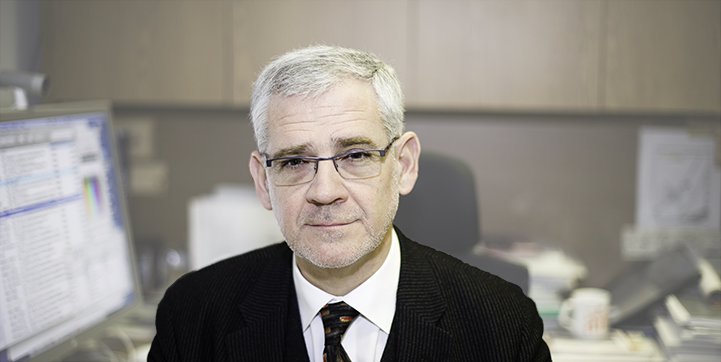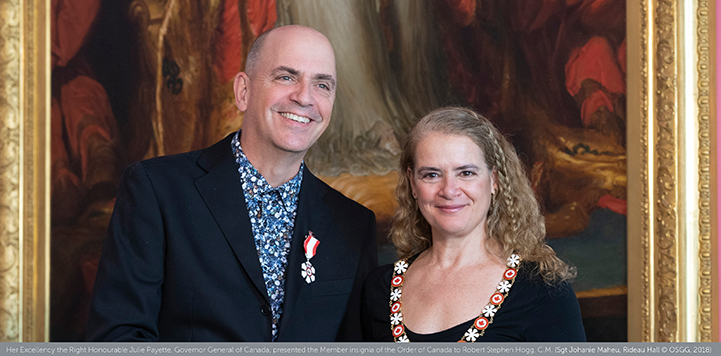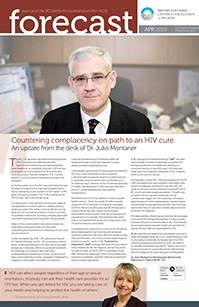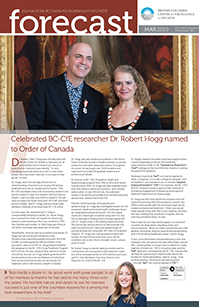STOP HIV/AIDS®
Documents & Reports
HIV Monitoring Quarterly Reports, Third Quarter 2019
- HIV Monitoring Quarterly Report for British Columbia, Third Quarter 2019
- HIV Monitoring Quarterly Report for Fraser Health, Third Quarter 2019
- HIV Monitoring Quarterly Report for Interior Health, Third Quarter 2019
- HIV Monitoring Quarterly Report for Northern Health, Third Quarter 2019
- HIV Monitoring Quarterly Report for Vancouver Coastal Health, Third Quarter 2019
- HIV Monitoring Quarterly Report for Island Health, Third Quarter 2019
HIV Monitoring Quarterly Reports, Second Quarter 2019
- HIV Monitoring Quarterly Report for British Columbia, Second Quarter 2019
- HIV Monitoring Quarterly Report for Fraser Health, Second Quarter 2019
- HIV Monitoring Quarterly Report for Interior Health, Second Quarter 2019
- HIV Monitoring Quarterly Report for Northern Health, Second Quarter 2019
- HIV Monitoring Quarterly Report for Vancouver Coastal Health, Second Quarter 2019
- HIV Monitoring Quarterly Report for Island Health, Second Quarter 2019
HIV Monitoring Quarterly Reports, First Quarter 2019
- HIV Monitoring Quarterly Report for British Columbia, First Quarter 2019
- HIV Monitoring Quarterly Report for Fraser Health, First Quarter 2019
- HIV Monitoring Quarterly Report for Interior Health, First Quarter 2019
- HIV Monitoring Quarterly Report for Northern Health, First Quarter 2019
- HIV Monitoring Quarterly Report for Vancouver Coastal Health, First Quarter 2019
- HIV Monitoring Quarterly Report for Island Health, First Quarter 2019
Countering complacency on path to an HIV cure

The BC-CfE applauds the news that emerged from CROI (Conference on Retroviruses and Opportunistic Infections) and captured global news headlines: an individual living with HIV has been in remission and off treatment for 18 months after receiving a bone-marrow transplant. The “London patient” is now the second individual to achieve HIV remission.
To briefly explain, as in the first case, this milestone was achieved through a bone-marrow transplant from a donor harbouring a rare mutation in the human CCR5 gene. Acting as a receptor, the CCR5 is necessary for HIV to enter cells in the human body.
It is important to note that HIV cure by bone-marrow transplantation is neither safe nor capable of being easily expanded. The reality is that we still don’t know when an HIV cure will be achieved. There is currently no available solution for achieving a broadly applicable cure that could help those living with HIV worldwide.
News of the London patient does demonstrate the potential for eradicating HIV from the body, underlining the importance of continuing HIV cure and vaccine research.
Under the leadership of BC-CfE Laboratory Director Dr. Zabrina Brumme, the BC-CfE continues to seek to better understand dormant HIV cells that accumulate and persist in the body. While on sustained treatment, an individual can achieve a viral load that is undetectable by standard blood tests, at which point they cannot transmit to others. However, if treatment is stopped or interrupted, viral levels can rebound.
Grasping the diversity of HIV residing within an individual (known as the viral reservoir) is a key stepping stone to identifying a cure.
Unfortunately, good news of slow progress towards an HIV cure could contribute to misconceptions. Combined with impressive advances in HIV treatment, it could lead some to believe HIV is a resolved issue.Dr. Anthony Fauci, Director of the US National Institutes of Health, told attendees of CROI we have reached a point of “understandable but unacceptable complacency.”
The bottom line is the HIV epidemic remains a public health concern. There are nearly 37 million people living with HIV in the world, including an estimated 13,000 in British Columbia and over 63,000 people in Canada. More than ever, health care providers, policymakers and the public must be on high alert for complacency. It is equally critical that we take every chance to implement the tools at our disposal to curb HIV and achieve an end to AIDS.
In the absence of a vaccine or a cure for HIV, providing early, widespread access to testing and sustained, universal treatment is the most effective means to stop HIV new infections. This is the concept supporting the proven successful, made-in-BC Treatment as Prevention (TasP) strategy that forms the foundation of the UNAIDS 90-90-90 Target to end AIDS by 2030. To meet this goal, by 2020, 90% of individuals living with HIV must be diagnosed, 90% of those diagnosed must be on treatment, and 90% of those on treatment must be virally suppressed.
In BC through the implementation of TasP, we have seen a steady increase in individuals accessing HIV testing and antiretroviral treatment, leading to a consistent decline in new HIV cases. HIV treatment today improves longevity and quality of life. However, there is still more we can do.
For example, a recent BC-CfE study published in PLOS-ONE uncovered new opportunities in the health care system to diagnose individuals living with HIV. Our study found one in seven individuals living with HIV in BC could have been diagnosed earlier—if health care providers had recognized certain key clinical conditions as triggers for HIV screening. Individuals aged 40 years or older, heterosexuals, people living in remote areas and people who had ever injected drugs were more likely to have had a missed opportunity for an earlier HIV diagnosis.
This data provides critical clues on how we can close gaps in access to HIV testing and treatment. It is also a useful reminder HIV does not discriminate. In BC, all individuals are recommended to ask their health care providers for regular HIV tests. We can all get tested for HIV.
While scientists and researchers worldwide continue to make remarkable advances in our understanding of HIV, it is too early to celebrate. As we approach the 2020 milestone towards ending AIDS by 2030, we need to accelerate investments and efforts. There is still much more to be done to support the needs of those living with HIV today and to reach our goal of ending AIDS.
Dr. Julio Montaner is the Executive Director and Physician-in-Chief of the BC-CfE
Celebrated BC-CfE researcher Dr. Robert Hogg named to Order of Canada

Dr. Robert (“Bob”) Hogg was officially inducted into the Order of Canada on February 1st, an accomplishment he doesn’t just see as an award but as a national responsibility. “It’s very humbling, especially when you start to meet other people who have been inducted, to be a part of that group,” he said.
Dr. Hogg’s work has strongly influenced our understanding of barriers to accessing HIV testing, treatment and care in Canada and the world. “[The BC-CfE] has always had a role of providing research not just for research’s sake, but research that will have an impact. I want to make sure that the research I do will have an impact for those living with HIV in BC and even across Canada,” said Dr. Hogg, during a small break between meetings at his downtown BC-CfE office.
In some ways, the hardworking Dr. Hogg is unexpectedly following his father, Dr. James Hogg, who received the Order of Canada for influencing medical understanding of the lung condition COPD. Ever humble and modest, Dr. Bob Hogg says filling in his father’s footsteps was never part of the plan.
Nonetheless, from his start as a postdoctoral fellow, Dr. Hogg has had a profound influence on the infrastructure supporting people living with HIV in BC. In 1992, as a demographer with an interest in the population aspects of HIV, Dr. Hogg helped establish the database for the BC-CfE’s Drug Treatment Program (DTP). At first, this was simply a filing cabinet to house clinical trial records.
Dr. Hogg helped guide the DTP’s transformation into a secure database of individuals from across the province who are accessing HIV treatment, which still informs a wealth of studies. Dr. Hogg, who also serves as a professor in the Simon Fraser University Faculty of Health Sciences, is a prolific researcher and a well-respected mentor. Throughout his career, he has taught over 3,000 students and supervised more than 50 graduate students and postdoctoral fellows.
As Director of BC-CfE’s Population Health and Epidemiology program from 1992 to 2014 and Senior Scientist since 2015, Dr. Hogg has been awarded more than $50 million in grants for province- and Canada-wide studies. In over 500 articles, his published research has laid the groundwork for transforming how we perceive, research and treat HIV.
Trained in anthropology, demography and epidemiology, Dr. Hogg has investigated barriers to HIV treatment, health and mental health challenges faced by marginalized people living with HIV, the unique needs and challenges of women living with HIV, and the increasingly emerging issue of people aging with HIV. Dr. Hogg’s study in the leading medical journal The Lancet was among the first to demonstrate that lower socioeconomic status decreased length of survival among men living with HIV. Even in his earliest research, Dr. Hogg was crafting questionnaires and surveys “to see [HIV] as more than just a clinical condition, but to see it from a broader social, cultural point of view.”
“Dr. Robert Hogg is a world-leading scientist and his contributions are among those that helped to create and refine new approaches to HIV treatment and care,” said Dr. Julio Montaner, Executive Director and Physician-in-Chief of the BC-CfE.
Dr. Hogg’s research provides important support to the case for expanding access to HIV treatment, supporting the made-in-BC Treatment as Prevention (TasP) strategy as the most effective means of curbing the global HIV epidemic.
Strategies inspired by TasP can now be applied to other contagious or socially contagious diseases, such as hepatitis C and substance use, to achieve Targeted Disease Elimination (TDE®). For example, the BC-CfE’s BOOST initiative is looking to apply similar methods to increasing engagement in lifesaving opioid agonist treatment.
Dr. Hogg says the most significant progress since he started researching HIV at the epidemic’s peak in the 1990s is that people with HIV are living longer due to modern antiretroviral treatment. “Often, you would meet [people living with HIV] at one meeting, and then the next meeting they would be in hospital, and the next they would be dead,” he said.
Even in light of such important progress, it’s crucial scientists are dedicated to dispelling myths and misconceptions. “When you talk to people that are in the general community, they just assume that people [living with HIV] are being treated and cured,” said Dr. Hogg.
“HIV is not going away, and the TasP approach, pioneered by the BC-CfE, ensures that we have an opportunity to significantly reduce the burden for future generations, said Dr. Hogg. “In an exciting advance, the lessons we have acquired through TasP can now be applied to TDE®.”
HIV Monitoring Quarterly Reports, Fourth Quarter 2018
- HIV Monitoring Quarterly Report for British Columbia, Fourth Quarter 2018
- HIV Monitoring Quarterly Report for Fraser Health, Fourth Quarter 2018
- HIV Monitoring Quarterly Report for Interior Health, Fourth Quarter 2018
- HIV Monitoring Quarterly Report for Northern Health, Fourth Quarter 2018
- HIV Monitoring Quarterly Report for Vancouver Coastal Health, Fourth Quarter 2018
- HIV Monitoring Quarterly Report for Island Health, Fourth Quarter 2018


